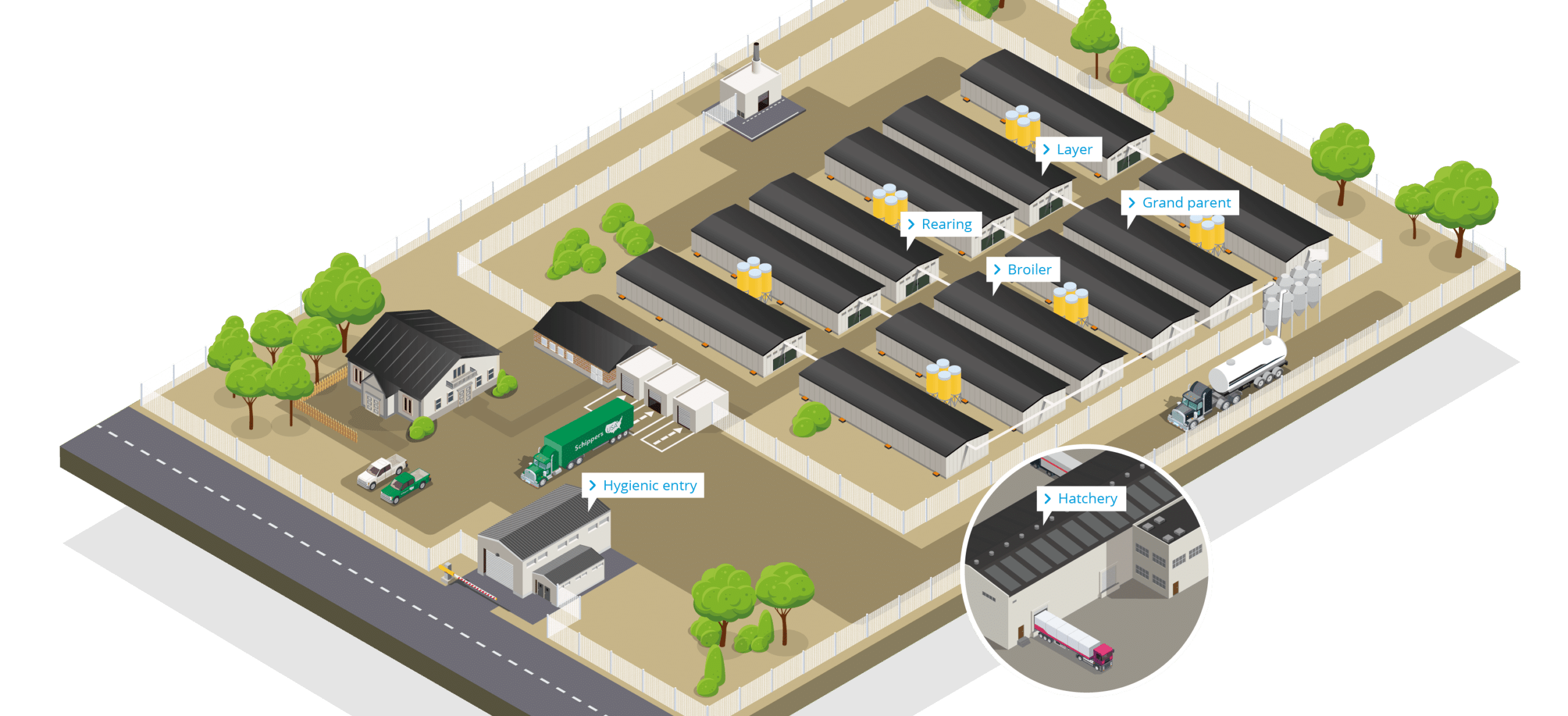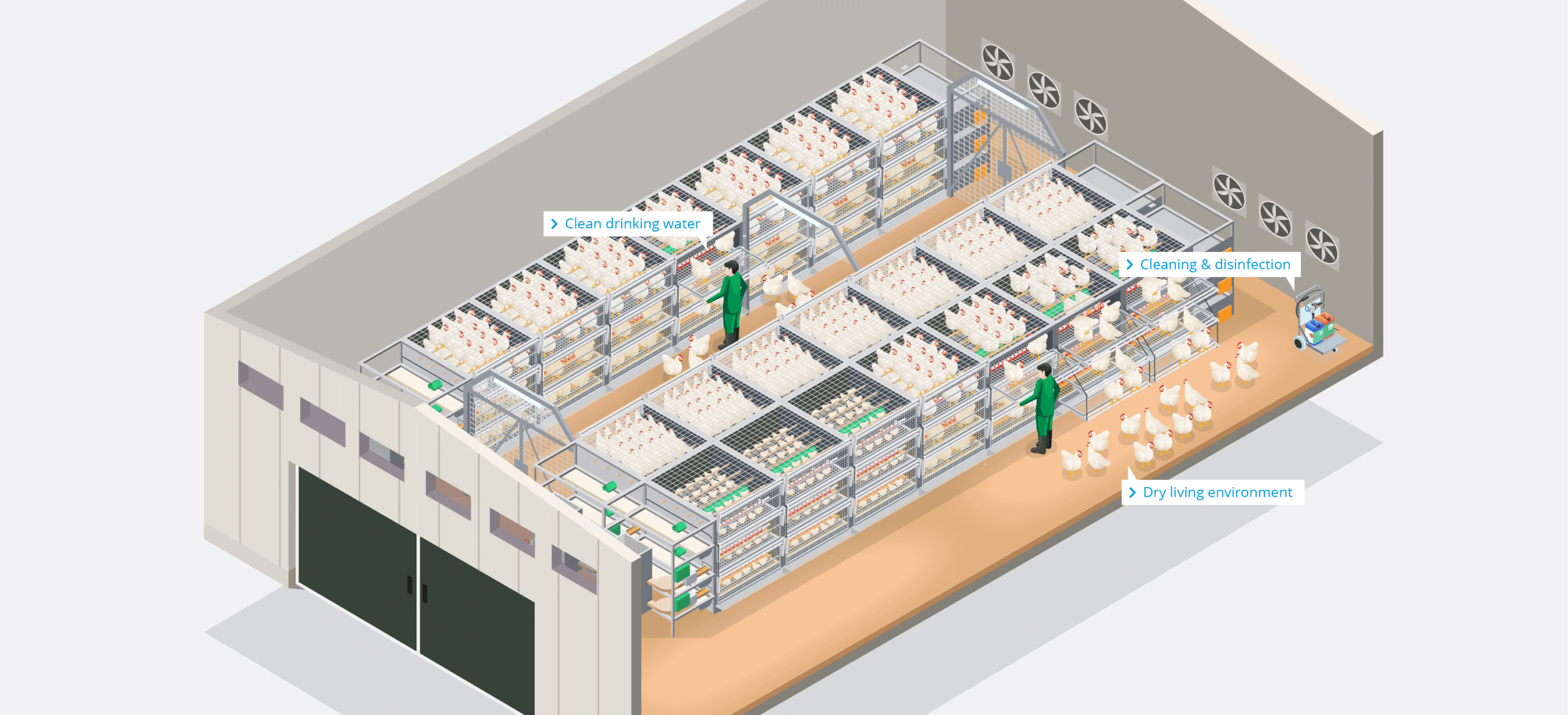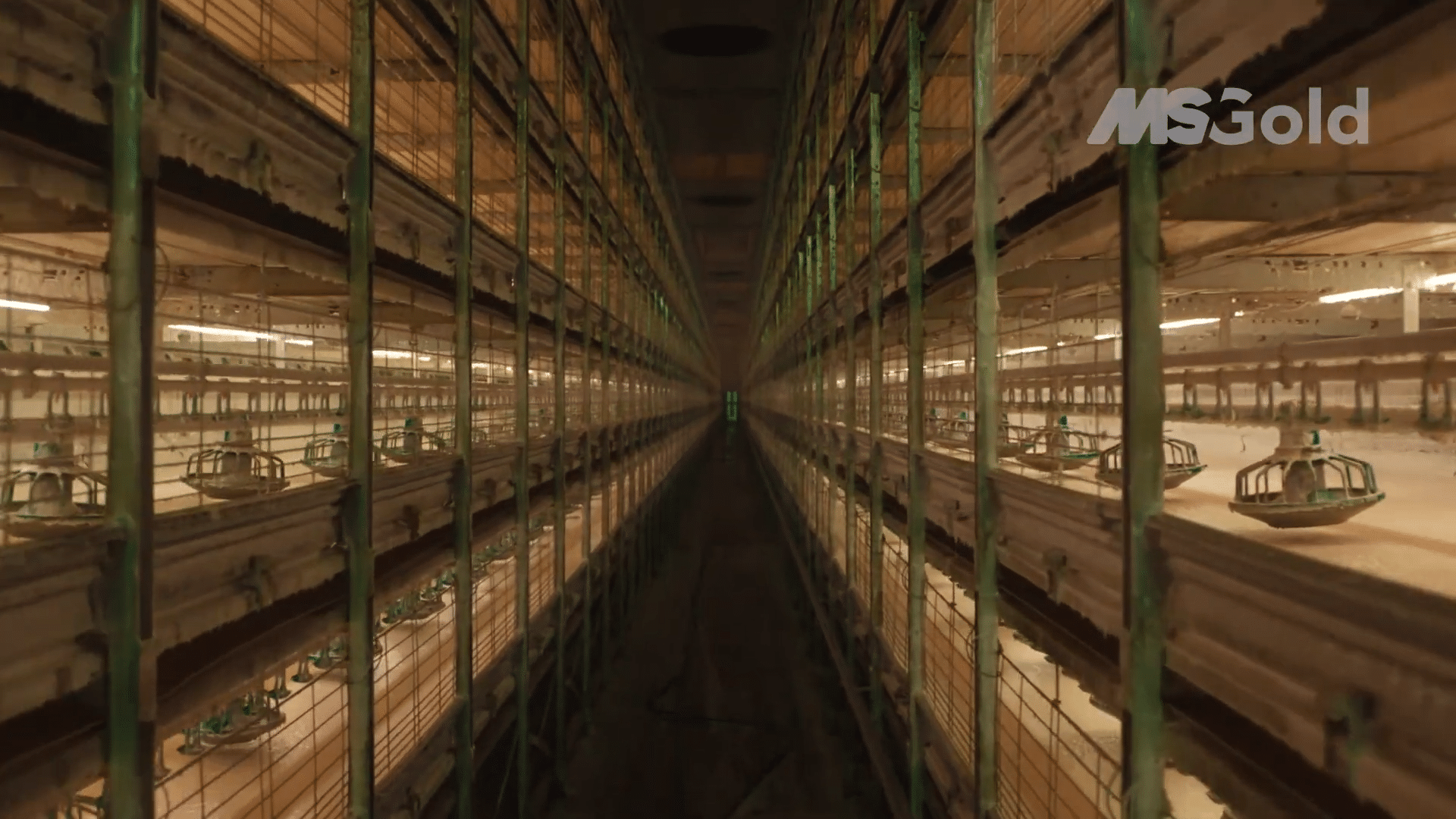
Hatchery
The hatchery is a specialized facility in the poultry industry where fertile eggs are incubated under controlled conditions to hatch into chicks.
Hygienic entry
The hygienic entry area at a poultry farm refers to a controlled and designated zone where individuals, including farm workers, visitors, and service providers, must adhere to specific hygiene protocols before entering the main production area of the farm.
Rearing
Rearing farms providing optimal conditions that promote the healthy growth and preparation of the young birds for their future roles as egg-laying hens or broilers
Layer
A layer farm is dedicated to raising hens specifically for egg production. In a layer farm, the primary focus is on maximizing egg production while maintaining the health and well-being of the laying hens. These hens are referred to as "layers" because they are raised primarily to lay eggs that are collected for human consumption.
Grand parent
A grandparent (GP) farm, also known as a grandparent stock farm, is a specialized facility in the poultry industry that is dedicated to breeding and producing the initial generation of breeding birds. These breeding birds serve as the foundation for the production of parent stock, which in turn produces the commercial broilers or layers that are raised for meat or egg production.
Broiler
A broiler farm is dedicated to raising chickens specifically for meat production. The chickens in these farms are known as broilers. These farms focus on efficiently producing chickens that reach market weight within a relatively short period, typically around 5 to 7 weeks, depending on the desired size, market preferences and regulations.
Biosecurity programsfor poultry farms
Rearing
What’s important at the rearing farm?
Biosecurity measures in rearing farms are designed to prevent the introduction and transmission of diseases. These measures include controlling the movement of people, animals, equipment, and vehicles in and out of the farm, as well as implementing hygiene practices and disinfection procedures. The goal is to create a controlled environment that minimizes the risk of disease introduction and spread.

Common challenges
- Coccidiosis: affects the intestinal tract and can lead to reduced growth rates, poor feed conversion, and increased susceptibility to other diseases.
- Hygiene management: insufficient cleaning practices can lead to cross-contamination between flocks
- Poor drinking water: Access to clean and healthy drinking water is crucial to maintain animal health
- Viruses: Can spread rapidly through direct contact, contaminated equipment, and even through the air.
- Respiratory illnesses: often caused by high humidity, inefficient ventilation or poor litter management.
- Uniformity of the flock: high uniformity makes it easier to implement effective improvements.
HyCare programs for rearing

Cleaning & disinfection
Proper cleaning and disinfection help eliminate pathogens, reduce disease risks, and create a healthier environment for the birds. A proper cleaning and disinfection program needs to take many factors in account.
Cleaner selection
- Select appropriate foaming detergents that effectively break down dirt, grease, and organic material. Make sure they are safe for use around poultry and stick to vertical surfaces.
Disinfectant Selection
- Choose disinfectants effective against the specific pathogens of concern, including viruses, bacteria, and fungi. Rotate disinfectants periodically to prevent resistance development.
Application
- Using the right product for the job is important, but applying it in the right way consistently is crucial to create a germ-free environment before every round.
Contact Time
- Allow disinfectants to remain in contact with surfaces for the recommended duration to ensure effective pathogen inactivation.
Training
- Train farm personnel on proper cleaning and disinfection procedures, emphasizing the importance of consistent and thorough practices

Dry living environment
To maintain a dry living environment in poultry houses, it’s important to ensure proper ventilation, effective litter management, and adequate drainage systems. The dry living environment program aims to minimize the risk of high moisture to the flock.
Prevent respiratory illnesses:
- High humidity combined with poor ventilation, can contribute to the development of respiratory issues in birds. Damp conditions can promote the growth of mold, fungi, and bacteria that can irritate the respiratory tract and lead to respiratory diseases.
Minimizing Foot Health Problems:
- Birds that constantly stand on wet surfaces are more prone to skin lesions, footpad dermatitis, and bacterial infections that affect their mobility and overall health.
Preventing Coccidiosis:
- Coccidiosis is a parasitic disease caused by protozoa of the genus Eimeria. The parasite thrives in damp and dirty conditions, and wet litter provides an ideal environment for coccidiosis to spread among birds. Keeping the environment dry helps reduce the risk of coccidiosis outbreaks.
Improved Bedding Material:
- In poultry houses that use bedding material (such as wood shavings), a dry environment helps maintain the quality and effectiveness of the bedding. Wet bedding can become compacted, less absorbent, and less effective at providing insulation.
Ammonia Control:
- Moist conditions contribute to the release of ammonia from accumulated manure, which can lead to poor air quality and respiratory issues for the birds and farm workers. A dry environment helps control ammonia emissions.
Enhanced Growth and Performance:
- Birds raised in a dry environment are more likely to have better growth rates, improved feed conversion, and better overall performance.
Clean drinking water
Providing rearing birds in poultry houses with access to clean drinking water is essential for their health, growth, and overall well-being. Water is a fundamental nutrient that plays a critical role in various physiological processes within the body, including:
- Nutrient Transport
- Temperature Regulation
- Digestion and Nutrient Absorption
- Feed Consumption
- Immune System Function
- Electrolyte Balance
- Waste Elimination
- Feather Health
Clean and fresh water is a fundamental requirement for maintaining bird health and supporting their growth and production. The HyCare Clean Water Program prioritize providing access to clean drinking water at all times to ensure optimal bird performance and well-being.
Proper cleaning and disinfection help eliminate pathogens, reduce disease risks, and create a healthier environment for the birds. A proper cleaning and disinfection program needs to take many factors in account.
Cleaner selection
- Select appropriate foaming detergents that effectively break down dirt, grease, and organic material. Make sure they are safe for use around poultry and stick to vertical surfaces.
Disinfectant Selection
- Choose disinfectants effective against the specific pathogens of concern, including viruses, bacteria, and fungi. Rotate disinfectants periodically to prevent resistance development.
Application
- Using the right product for the job is important, but applying it in the right way consistently is crucial to create a germ-free environment before every round.
Contact Time
- Allow disinfectants to remain in contact with surfaces for the recommended duration to ensure effective pathogen inactivation.
Training
- Train farm personnel on proper cleaning and disinfection procedures, emphasizing the importance of consistent and thorough practices

To maintain a dry living environment in poultry houses, it’s important to ensure proper ventilation, effective litter management, and adequate drainage systems. The dry living environment program aims to minimize the risk of high moisture to the flock.
Prevent respiratory illnesses:
- High humidity combined with poor ventilation, can contribute to the development of respiratory issues in birds. Damp conditions can promote the growth of mold, fungi, and bacteria that can irritate the respiratory tract and lead to respiratory diseases.
Minimizing Foot Health Problems:
- Birds that constantly stand on wet surfaces are more prone to skin lesions, footpad dermatitis, and bacterial infections that affect their mobility and overall health.
Preventing Coccidiosis:
- Coccidiosis is a parasitic disease caused by protozoa of the genus Eimeria. The parasite thrives in damp and dirty conditions, and wet litter provides an ideal environment for coccidiosis to spread among birds. Keeping the environment dry helps reduce the risk of coccidiosis outbreaks.
Improved Bedding Material:
- In poultry houses that use bedding material (such as wood shavings), a dry environment helps maintain the quality and effectiveness of the bedding. Wet bedding can become compacted, less absorbent, and less effective at providing insulation.
Ammonia Control:
- Moist conditions contribute to the release of ammonia from accumulated manure, which can lead to poor air quality and respiratory issues for the birds and farm workers. A dry environment helps control ammonia emissions.
Enhanced Growth and Performance:
- Birds raised in a dry environment are more likely to have better growth rates, improved feed conversion, and better overall performance.
Providing rearing birds in poultry houses with access to clean drinking water is essential for their health, growth, and overall well-being. Water is a fundamental nutrient that plays a critical role in various physiological processes within the body, including:
- Nutrient Transport
- Temperature Regulation
- Digestion and Nutrient Absorption
- Feed Consumption
- Immune System Function
- Electrolyte Balance
- Waste Elimination
- Feather Health
Clean and fresh water is a fundamental requirement for maintaining bird health and supporting their growth and production. The HyCare Clean Water Program prioritize providing access to clean drinking water at all times to ensure optimal bird performance and well-being.

Contact our poultry manager
Martijn Schippers
Martijn Schippers is the General Manager for Schippers USA and the manager for dairy and poultry.